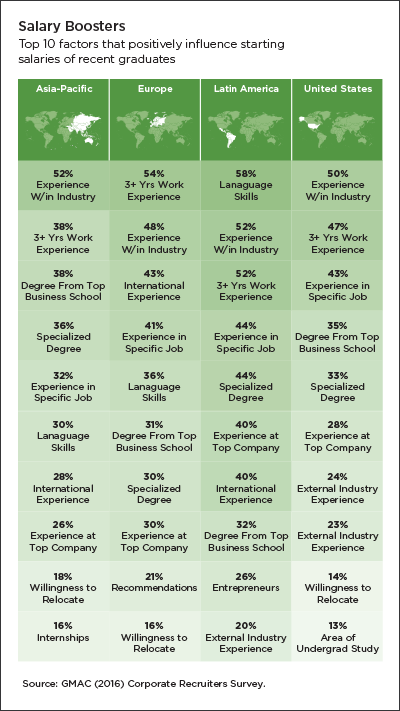All-new data from corporate recruiters shed light on what matters when it comes to determining salaries for new b-school hires.

Employers consider many variables when determining starting salary levels for recent graduate business school hires. Aside from keeping salary offers aligned with prevailing economic indicators, such as local cost-of-living and inflation rates, and industry pay standards for different job levels and functions, corporate recruiters consider a broad range of factors when designing competitive pay packages for new hires. All of these will have a significant bearing on what recent b-school graduates can expect in their first post-degree job.
This year, for the first time, respondents to GMAC’s Corporate Recruiters Survey were asked to rank 18 different factors in terms of which ones would have the greatest positive influence on starting base salaries their company would offer to recent graduate business candidates. Overall, the factors selected most frequently relate to candidates’ work experience, with some notable differences by employer world region:
- Language skills have the greatest influence on salaries offered by Latin American employers;
- More so than employers in any other region, 43 percent of European companies would consider international experience a plus when setting starting salaries for business school graduates; and
- Employers from Asia-Pacific are more likely than those in other regions to consider a degree earned from a top business school as a key factor in setting starting salaries for recent business school hires.

Examining the results on an industry-by-industry basis also reveals some interesting differences:
- Nearly two-thirds of employers in the energy and utilities sector (greater than any other industry) cited experience within the industry (62% of respondents) and having three-plus years of work experience (59%) as factors that would most positively influence starting salary offers;
- Nearly half of energy and utilities employers (48%) and high-tech companies (46%) said a specialized degree or knowledge would positively influence starting base salaries for recent business graduates;
- A majority of manufacturers (54%) regard graduation from a top-ranked business school as a factor that would have a positive influence on starting salaries offered to recent b-school graduates;
- Earning a degree from a top-ranked business school ranked fourth highest across most industries as having a positive influence on starting salary levels.
For more 2016 Corporate Recruiter Survey findings about hiring trends for MBA and non-MBA business master’s graduates, as well as recruiter behavior, talent identification, and school selection factors, visit www.gmac.com/corporaterecruiters and download our latest report.
Survey participants also have access to the accompanying interactive data report, an online tool they can use to search through the raw survey data for key variables important to their recruiting efforts.